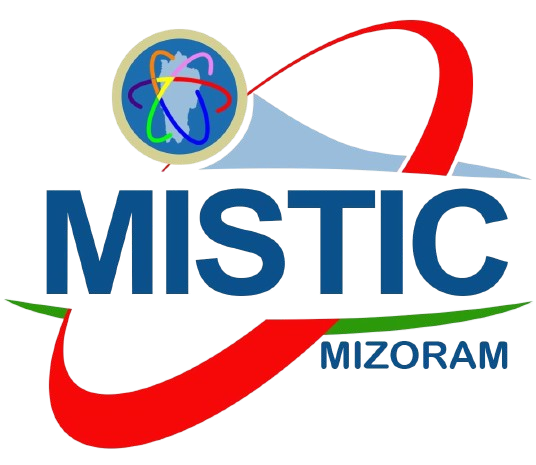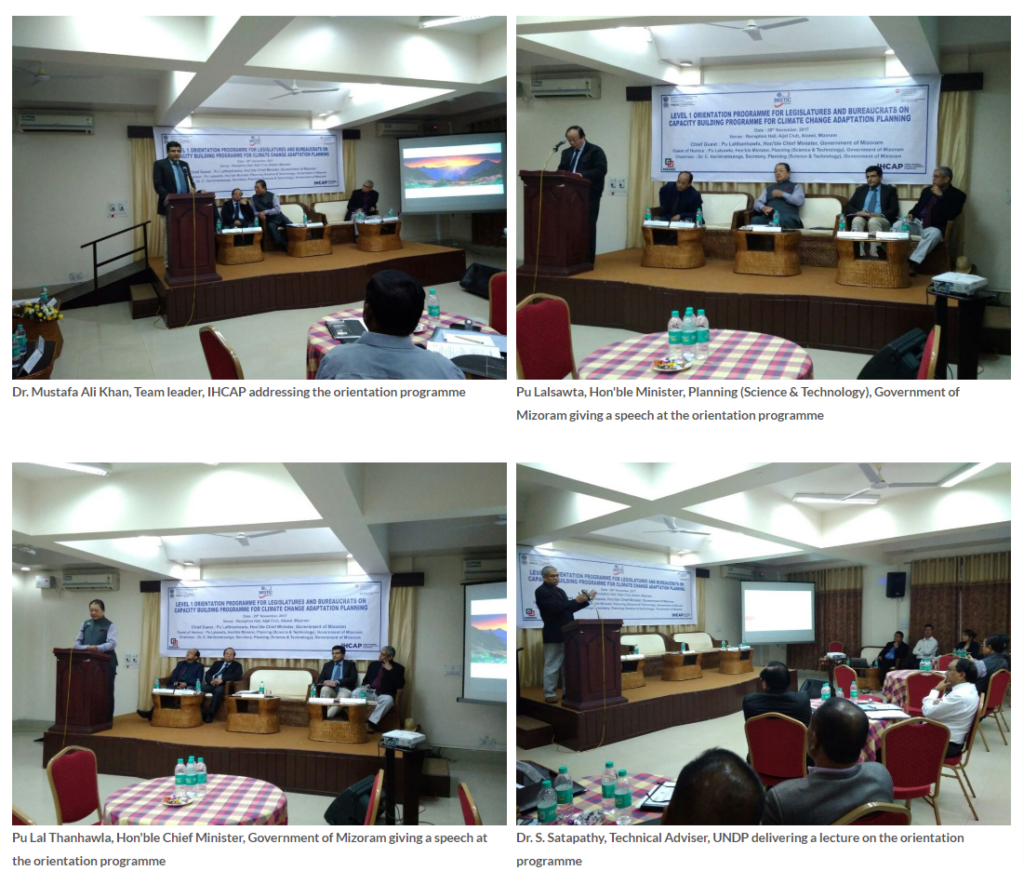LEVEL 1 ORIENTATION PROGRAMME FOR LEGISLATURES AND BUREAUCRATS ON CAPACITY BUILDING PROGRAMME FOR CLIMATE CHANGE ADAPTATION PLANNING
Home > SCCCC > Phase I > LEVEL 1 ORIENTATION PROGRAMME FOR LEGISLATURES AND BUREAUCRATS ON CAPACITY BUILDING PROGRAMME FOR CLIMATE CHANGE ADAPTATION PLANNING
Date: 20.11.2017 (Monday)
Venue: Reception Hall, Aijal Club, Aizawl, Mizoram.
Organised by:
Mizoram State Climate Change Cell, MISTIC supported by Department of Science & Technology through National Mission for Sustaining the Himalayan Ecosystem (NMSHE), Indian Himalayas Climate Adaptation Programme (IHCAP)-Swiss Agency for Development and Cooperation, and NABARD Consultancy Services (NABCONS)
BACKGROUND
To pursue the work plan and objectives of the State Climate Change Cell (SCCC) project under the National Mission for Sustaining the Himalayan Ecosystem (NMSHE) catalyzed and supported by Department of Science and Technology, Government of India, The Mizoram SCCC under the Mizoram Science, Technology and Innovation Council (MISTIC) felt the need to organize a seminar which could build up capacities and knowledge on certain aspect of Climate Change related issues in Mizoram. Thus, in collaboration with Department of Science & Technology – NMSHE, Swiss Agency for Development and Cooperation (SDC), Indian Himalayas Climate Adaptation Programme and NABARD Consultancy, a one day ‘Level 1 Orientation Programme For Legislatures And Bureaucrats On Capacity Building Programme For Climate Change Adaptation Planning’ was organized on 20th November 2017.
The orientation programme was attended by a total of 48 participants.
INAUGURAL PROGRAMME
The programme started with a welcome remarks by Chairman, Dr. C. Vanlalramsanga, Secretary, Planning (Science & Technology), Govt. of Mizoram. This was followed by a brief Remarks by Dr. Mustafa Ali Khan, Team Leader, IHCAP, Swiss Cooperation Office, Embassy of Switzerland, India on the programmes and initiatives taken up by the Government of India on Climate Change. Pu Lalsawta, Hon’ble Minister, Planning (Science & Technology), Government of Mizoram, who is the Guest of Honour also gave a speech, in which he welcomed all the participants and highlight the importance of the programme and wishes that everyone will benefit in one way or another. Lastly, the Chief Guest of the function, Pu Lalthanhawla, Hon’ble Chief Minister, Government of Mizoram, address the participants and the resource person and thank the initiatives of Government of India through the Department of Science & Technology, New Delhi in organizing such type of Orientation programmes for Legislatures and Bureaucrats on Capacity Building Programme for Climate Change Adaptation Planning.
TECHNICAL SESSION
Lecture 1
Overview of Climate Change Programme in Mizoram with Special Context to Mizoram State Climate Change Cell – Dr. R.K. Lallianthanga, Chief Scientific Officer, Directorate of Science & Technology, Govt. of Mizoram.
In his presentation, Dr. R.K. Lallianthanga gave a brief account on the establishment of Mizoram State Climate Change Cell, its objectives and the ongoing initiatives of the Cell along with its physical outputs, capacity buildings and public awareness conducted.
Lecture 2
State Action Plan on Climate Change – Mr. K. Kire, IFS, Addl. PCCF & Nodal Officer (Climate Change), Department of Environment, Forest & Climate Change, Govt. of Mizoram.
Mr. K. Kire gave a brief account of the State Action Plan on Climate Change along with the lead departments implementing the 9 missions of the SAPCC. The achievements of the Mission departments was highlighted. It was emphasized that the present SAPCC will be over by 2017 and that revision of the SAPCC is needed for which all the concerned line departments are requested to come forward with their experience and lessons learnt to benefit the SAPCC.
Lecture 3
Preparedness for Climate Resilient State Plan of Mizoram – Dr Sachidananda Satapathy, Technical Adviser (CC&C), UNDP.
In his presentation, Dr. Satapathy gave a highlight of the 4X4 Assessment report which focus on 4 climate sensitive regions in India with their likely impacts in 2030s on 4 sectors viz., Agriculture, Ecosystems and Biodiversity, Water resources and Human Health affected by Climate Variability. Thereafter Climate policy at International and India’s Nationally determined contribution was discussed. Climate Finance was presented in detail on the different source of financing and agencies that implement it through National Designated Authority and Multilateral agencies. The presentation ends with the ongoing adaptation project of Mizoram supported by National Adaptation Fund on Climate Change.
The programme adjourned with a vote of thanks from Mr. Samuel Lalmalsawma, Senior Scientific Officer, Mizoram Science, Technology & Innovation Council, thanking all the participants, resource persons and the joint efforts of the organizers in making the orientation programme successful.

